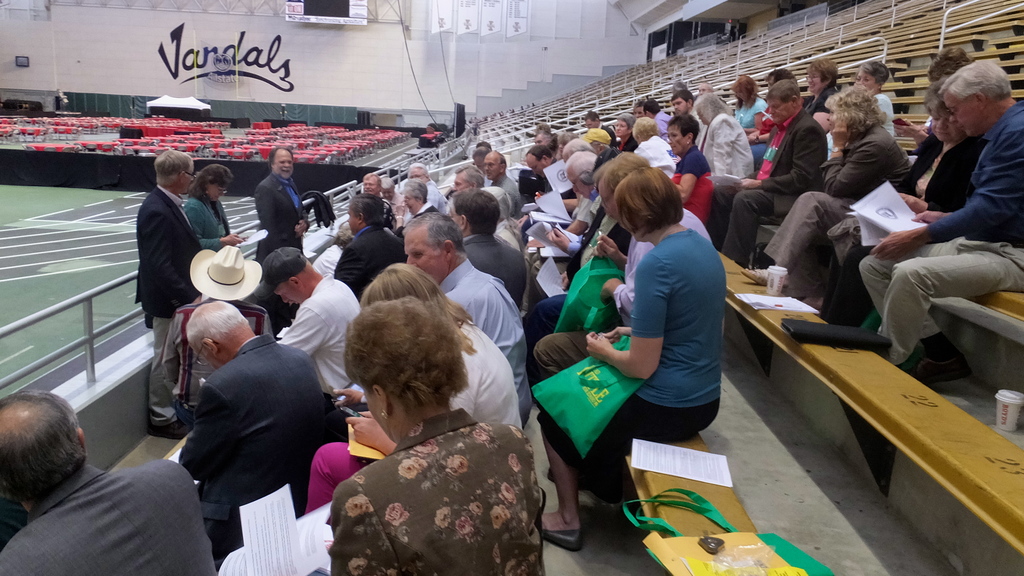When Republicans unexpectedly adjourned their convention Saturday, a slate of education resolutions and platform tweaks died on the vine.

A resolutions committee advanced several education-related proposals Friday:
- One sought to give parents choice and input in curriculum selection.
- Another called on Gov. Butch Otter to execute an exit strategy from Idaho Core Standards in favor of a set of “higher quality, less invasive standards and testing.”
- A third called on the state to encourage Bible studies in primary and secondary schools, and place bibles in classrooms.
In order to be adopted, those resolutions had to be approved by a majority vote of all party delegates.
Republicans never reached that point Saturday. The resolutions and party platform tweaks disappeared upon adjournment.
“Absolutely it was a casuality of things breaking down,” Maria Nate, a delegate from East Idaho’s legislative District 34, said of the Common Core resolution. Nate, a former Madison County School Board member, is an active Common Core opponent.
Nate and other conservatives also opposed proposed policies tying teacher evaluations to students’ performance on the Common Core-aligned Smarter Balanced Assessment Consortium test.
Outgoing Superintendent of Public Instruction Tom Luna said the standards are simply goals for what students should know at the end of an academic term — and there must be accountability measures, such as assessments, to gauge performance and effectiveness.
Said Nate, a vocal critic of Luna: “I would like to see the party encourage elected leaders to grant more local control in education decisions. … I’d like to see Idaho get out of Common Core and get out of the SBAC testing process.”
Three days after the state convention imploded, it is a clear that a deep divide within the party has not been bridged.

The skirmish centered on seating delegates from Ada, Power and Bannock counties, and whether the process adhered to party rules.
Bryan Smith, the Idaho Falls attorney who unsuccessfully challenged U.S. Rep. Mike Simpson in last month’s primary, said more than 70 people filed complaints alleging they were prevented from being considered as delegates.
“We feel like there was discrimination, there was not the freedom of opportunity for us to become delegates and we were discriminated against based on our political philosophy and creed,” Smith said Monday.
The fight was nuanced and confusing, but can generally be seen as a battle over principles and for party control between establishment Republicans (many of whom support Otter) and more conservative Republicans who support the Republican Liberty Caucus or the Tea Party.
Liberty Caucus and Tea Party allies said the move to unseat delegates represented an effort to stick with principles and punish those who broke party rules.
Fred Tilman, a former House Education Committee chairman and the new chairman of the Ada County Republican Central Committee, insisted Tuesday that his group did not break any rules. He said he obtained legal opinions from former Attorney General David Leroy and party legal adviser Jason Risch that indicate no rules were broken.
Additionally, he said, Ada County was entitled to have 34 delegates on committees, but only four were seated.
Smith said that’s because Ada delegates were elected via “a secret list” and the names were not submitted by deadline. Tilman denies those accusations, saying he has the paper trail to back his case up.
When U.S. Rep. Raul Labrador abruptly adjourned the convention, he said existing Chairman Barry Peterson would retain power, resolutions would not be enacted and the party platform would remain unchanged.
Tilman sees it differently. He says serious questions remain about whether Peterson’s term expired – since he was up for reelection – and whether state officers retain power. Tilman expects the matter to be taken up by the State Central Committee, a large group including legislative district and county central committee chairmen.
As for the party’s future following the meltdown, Tilman said, “I haven’t a clue.”
He also said he wasn’t sure about who is at the heart of the fight.
“I don’t know who or what the Liberty Caucus is, and I don’t really care because once we are in the room, I thought we we’re supposed to all be Republicans,” Tilman said.
Further reading:
June 14, “Republican convention ends in meltdown.”
June 13, “GOP fights Common Core at convention.”
